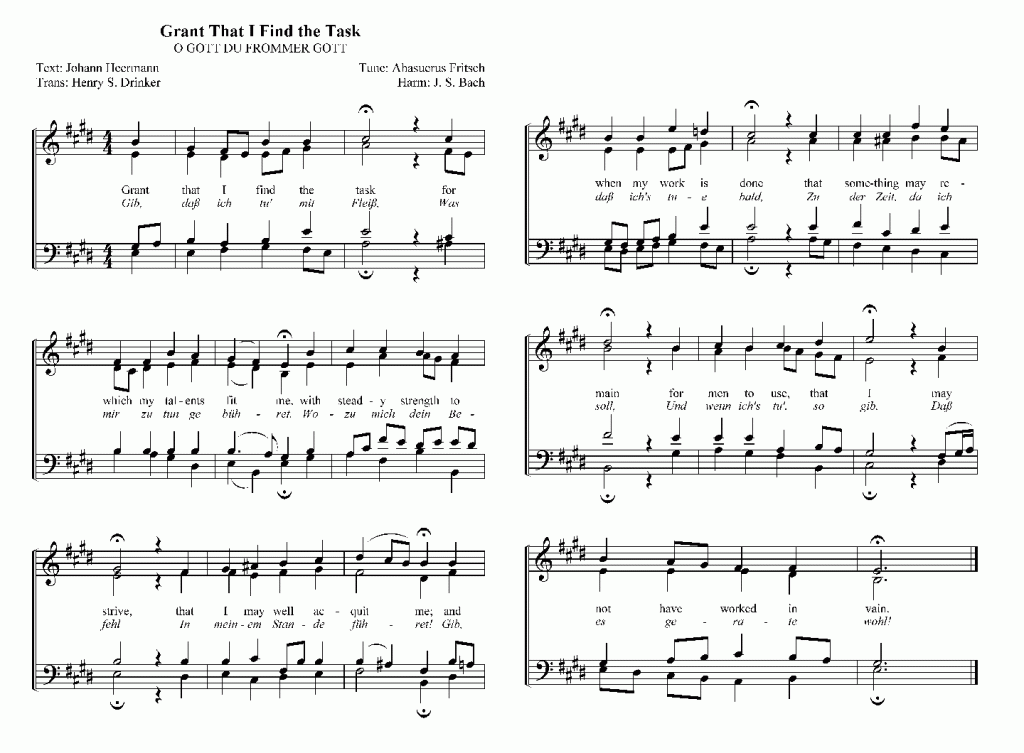(Continued)
Bach Chorale: “Grant That I Find the Task”28
Grant that I find the task
For which my talents fit me,
With steady strength to strive,
That I may well acquit me;
And when my work is done
That something may remain
For men to use,
That I may not have worked in vain.
If you wish to read the tribute to Dr. Hsu from this issue and see memories that others have posted, click here.
Notes:
1Alfred North Whitehead, The Aims of Education (New York: Macmillan, 1929, p. 69).
2Ibid., p. 68.
3Joe Light, “Leisure Trumps Learning in Time-Use Survey,” The Wall Street Journal (June 23, 2011).
4T. S. Eliot, The Four Quartets (London: Faber & Faber, 1979)
5Johann Nikolaus Forkel, Johann Sebastian Bach: His Life, Art, and Work (New York: Harcourt, Brace, and Howe, 1920), p. 99.
6George Steiner, Real Presences (Chicago: University of Chicago Press, 1989), p. 183.
7Alvin Plantinga, Warranted Christian Belief (New York: Oxford, 2000), p. 310.
8“Pecca fortitier, sed fortius fide et gaude in Christo!” Martin Luther’s Letter to Philip Melanchthon, August 1, 1521.
9Plantinga, p. 309.
10Anthony Tommasini, “Top 10 Composers: The Final List,” The New York Times (January 21, 2011).
11Karl Barth, Wolfgang Amadeus Mozart, trans. Clarence K. Pott. (Grand Rapids, MI: Eerdmans, 1986), pp. 19-23.
12Danielle Sweeney, “The Mozart effect: classical music and your baby’s brain,” Babycenter, February, 2009 (http://www.babycenter.com/0_the-mozart-effect-classical-music-and-your-babys-brain_9308.bc, Accessed July 5, 2011).
“Listening to classical music may soothe your baby and turn her into a classical fan later in life, but it won’t make her smarter. Researchers at Appalachian State University believe that they’ve debunked what has been called the Mozart effect, a temporary increase in intelligence experienced after listening to a piano sonata written by the famed composer.
The Mozart effect was first reported in 1993 by scientists at the University of California at Irvine, and replicated by the same group in 1995. The study (which did not look at the effect of Mozart on babies) found that college students who listened to a Mozart sonata for a few minutes before taking a test that measured spatial relationship skills did better than students who took the test after listening to another musician or no music at all…
The notion that babies would be smarter if they listened to classical music was born out of this hype. One year, the governor of Georgia mandated that a classic music CD — which contained the sonata and other pieces and was donated by Sony — be given to all new babies when they left the hospital.”
13Hans Küng, Mozart: Traces of Transcendence, trans., John Bowden (Grand Rapids, MI: Eerdmans, 1991).
14Cf. Liam Goligher, “The Lost Ark,” sermon on 1 Samuel 4, preached on June 12, 2011 at Tenth Presbyterian Church, Philadelphia, PA (http://www.sermonaudio.com/playpopup.asp?SID=612112050522 – Accessed August 22, 2011)
15D. Bruce Lockerbie, A Christian Paideia: The Habitual Vision of Greatness (Colorado Springs, CO: Purposeful Design Publications, 2005), p. 95.
16From the dedicatory preface to Jeremy Taylor, Holy Living and Holy Dying: Together with Prayers, Containing the Whole Duty of a Christian, etc. (1650, reprint, London: Henry G. Bohn, 1858). Quoted in Dallas Willard, The Spirit of the Disciplines: Understanding How God Changes Lives (New York: HarperCollins, 1988), p. 255.
17Quoted in John H. Sailhamer, Introduction to Old Testament Theology: A Canonical Approach (Grand Rapids, MI: Zondervan, 1995), p. 12. Sailhamer in turn quoted from the epigraph of Hans-Georg Gadamer, Truth and Method (New York: Crossroad, 1975). Rilke’s original German text as quoted by Gadamer (Wahrheit und Methode. Tübingen: J. C. B. Mohr, 1960) reads as follows:
Solang du Selbstgeworfenes fängst, ist alles
Geschicklichkeit und läßlicher Gewinn –
erst wenn du plötzlich Fänger wirst des Balles,
den eine ewige Mitspielerin
dir zuwarf, deiner Mitte, in genau
gekonntem Schwung, in einem jener Bögen
aus Gottes großem Brückenbau:
erst dann ist Fangen-können ein Vermögen, –
nicht deines, einer Welt.
18Ibid. p. 13.
19Michael Walker, “Habermas and Ratzinger on the Future of Religion,” Scottish Journal of Theology (2010), pp. 456-473.
20John Milton, “On His Blindness,” Selected Poems (New York: Dover Publications, 1993).
21Thomas O. Chisholm, “Great Is Thy Faithfulness.”
22Olivier Messiaen and Bernard Gavoty, “Who Are You, Olivier Messiaen?” Tempo (Summer, 1961): 14.
23Cf. C. S. Lewis, Surprised by Joy: The Shape of My Early Life (New York: Harcourt, Bruce, 1955).
24C. S. Lewis, “The Weight of Glory.” The Weight of Glofy and Other Addresses (Grand Rapids, MI: Eerdmans, 1965), p. 14.
25Dallas Williard at a Faculty Forum at University of San Diego (June 21, 2003) (http://dwillard.org/biography/tenure.asp, Accessed July 29, 2011).
26Mae Stewart, Is “Good” Enough? Guidelines for Choosing Values (Langhorne Manor, PA: Philadelphia College of Bible, 1983), pp. 15-16.
27Todd Williams, “A Way Worth Traveling,” PBU Today (Fall 2010), p. 4.
28O GOTT, DU FROMMER GOTT, text by Johann Heermann, English translation by Henry S. Drinker, tune by Ahasuerus Fritsch, harmonization by J. S. Bach (BWV 45). The score posted with this article was set by Timothy Shaw, Assistant Professor in the School of Music and Performing Arts.
